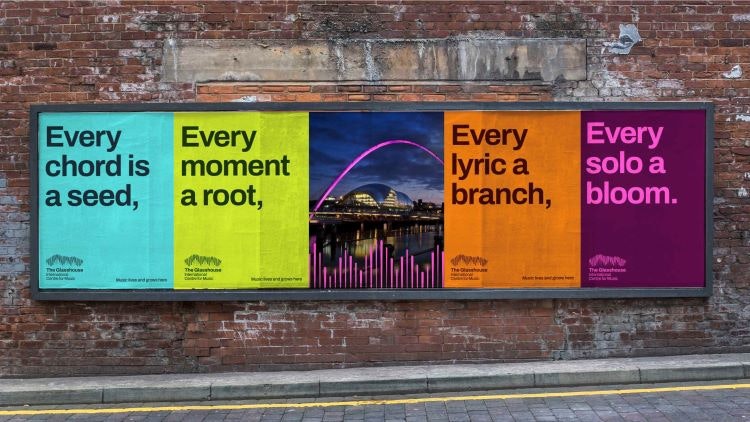Formed by a partnership of creative industry leaders, the Northern Creative Corridor (NCC) coalition aims to “unlock the huge potential in the North of England’s Creative Industries sector” through a cross-regional growth strategy. This largely focuses on nurturing and investing in existing ‘creative clusters’ (defined as “cities and regions that have high concentrations of creative businesses”) and forming a framework in which policymakers and industry can work together to realise the potential of these.
The blueprint for the formation of the NCC has been co-designed by the RSA (the Royal Society for the Encouragement of Arts, Manufactures and Commerce) and Arts Council England, working with Creative PEC (the Creative Industries Policy and Evidence Centre) and stakeholders across the North of England. It aims to form a “trailblazing model for regional economies across the UK”.
According to the NCC, the North of England in particular would benefit from a coordinated plan to grow its creative industries because “clusters of intense creative activity” in the North are more geographically dispersed than those in the South-east, which is “dominated by the super-cluster that is London”.
Data commissioned by the Department for Digital, Culture, Media and Sport from the Office for National Statistics has identified various geographical clusters in which representation for particular creative disciplines is strong. For design, it suggests Skipton and Harrogate in North Yorkshire, Penrith in Cumbria, and West Yorkshire’s Halifax; while advertising and marketing were heavily represented in Harrogate, Leeds and Manchester. It identified clusters for crafts in Blyth and Ashington, Kendal and Huddersfield.
Dan Crowder is founder and managing director at design industry-specific recruitment agency Craft, which has offices in Leeds and Manchester. He is “fully in support of a creative ‘Northern Powerhouse’ and anything that helps coordinate, expand, and celebrate the North’s design excellence,” and says that “having the North’s creative resources combined is much better than them being fragmented”.

“It cannot and will not work in a vacuum.”
RSA’s research has shown that the creation of the NCC could mean an additional £10bn raised each year in Gross Value Added (GVA) in the region by 2030. The NCC proposals are based on research collated in the Northern England’s Creative Industries: background paper, which lays out various policy-based “pre-conditions for growth”, such as immigration, transport and digital infrastructure; alongside three key areas where “by working together… policy and industry leaders in the North could supercharge growth in the creative industries sector”. These are the skills to grow, access to finance and investment in innovation.
“I would add diversity into that mix,” says Steve Pearce, managing director at Manchester-based design studio Love. Craig Oldham, founder of his eponymous design studio and author of In Loving Memory of Work, a visual history of the miners’ strike, goes further. “If this investment is indeed focused on growth then investment in the social aspect is required to support it — transport, homes, etc. I’m not laying this on the door of the RSA: the government has proven time and time again it’s hardly delivering on the issues that would massively contribute to the initiative being successful. It cannot and will not work in a vacuum.”
In 2021, Oldham worked with Alice Fraser to create Outside Directory, a growing list of studios, organisations, and networks, working in the creative industries outside of London. “There is a huge creative presence outside London, and we need more champions, more investment, more connectivity, more options, more houses, more trains, more graduates…” says Oldham.
The government has proven time and time again it’s hardly delivering on the issues that would massively contribute to the initiative being successful
Simon Forster, ECD and founder of Leeds-based design agency Robot Food, agrees that better representation for the creative industries in the North “starts with mindset”, but is also dependent on improved infrastructure. “I couldn’t care when HS2 was scrapped, as we can still get to London in under 2.5 hours, but I’d like to narrow the distance across the Pennines, with a faster and more reliable train service to broaden recruitment and attract talent from Manchester and Liverpool,” he says.
The NCC research paper underscores the importance for areas to maintain their “unique local identity while enjoying the benefits of being part of a super-cluster”; balancing locally tailored investments with cross-Northern strategies “which can leverage different strengths, including benefitting from the strong global brand the North of England already enjoys”.

Northern pride
That sense of regional pride seems strong among northern agencies. Forster says his agency is “massively proud of being Yorkshire-based but it doesn’t define or limit us. Yorkshire people are known for being empathetic, straight talking, hard-working and doing what they say they will, which are values that do us well as an agency.” He continues, “We’re also not London-centric which our clients see as a huge point of difference and benefit.”
Pearce echoes these sentiments. “As Love, we identify very clearly as a northern agency,” he says. “We think that it provides a culturally sharp and slightly provocative edge to our creative work, along with a straight-talking, hard-working and approachable way of working.”
Love ECD and founder Dave Palmer concurs, saying that its Manchester roots have “defined” the agency, since they’ve helped instil a unique mentality that it takes into client work. “When you operate as a challenger brand you often need a ‘monster’, and for us our monster was the London-centric creative establishment,” he says. “Not from a place of animosity, but more because it forced us to raise our game to compete.”
Palmer adds that Love has never received help from any “regional entities” – and nor has it expected to. “If anything, the lack of a northern creative powerhouse is due to a northern lack of self-belief,” he says. “Often we’re beaten before we start, and there’s a weary resignation that ‘big work’ goes to the South, that talent eventually goes to the South and that clients buy southern creative services even if they themselves are based in the North. What we need is a good dose of self-belief.”

“Tens, if not hundreds of thousands” of new jobs
While locality and identity are important, many creatives suggest that as with many companies post-pandemic, their work is more global than ever. “During the pandemic when we suddenly had more global clients and everyone stopped asking where we were based… it feels like the world (and not just the UK) has got smaller,” says Forster.
David Simpson, CEO and creative director at Manchester-based Music, says that while the agency has “always been inspired by the colliding triumvirate of music, football and design that Manchester delivers on the world stage, and you can see that in our DNA,” it doesn’t identity as a ‘northern’ design agency since its clients hail from across the UK.
During the pandemic we suddenly had more global clients and everyone stopped asking where we were based: the world has got smaller
“We design for British culture and for that our home base isn’t relevant,” he says. “The biggest shift for us in recent years has been the acceptance of a decentralised talent pool which means we get to work with great designers irrespective of their location and we think you can see that in how our work captures the national spirit, not a specific northern culture.”
The North of England’s demographics make it particularly ripe for a programme focusing on boosting its creative industries, according to the NCC, which says that growth of the scale that it proposes would create “tens if not hundreds of thousands” of new jobs – an especially pressing issue in light of the fact that “rates of unemployment and labour market inactivity also tend to be higher in the North of England”.
Effectiveness hinges on grass-roots involvement
The NCC proposals are underpinned by the Northern Creative Corridor charter, which details the areas where local and sector leaders can collaborate across skills, finance, innovation, and communication. Among the 30 founder signatories of the charter are Design Council chief design officer Cat Drew; BBC director-general Tim Davie; Channel 4 CEO Alex Mahon; Dave Moutrey, CEO of Manchester arts centre HOME; Sir Peter Bazalgette, Creative Industries Council co-chair and chair at the Royal College of Art; Caroline Norbury, CEO of Creative UK; and Ubisoft managing director Lisa Opie.
Each signatory has committed to making the North of England “one of the best regions in the UK for creative industries to thrive” through actions such as contributing to the administration and development of the corridor, or seeking out opportunities for partnerships or investments to support its creation.
“While I see a lot of creative councils and academic institutions involved, I’d like to see more creative businesses added in,” says Pearce at Love. “It’s creative agencies and consultancies who ultimately, in the day-to-day, drive exports, nurture talent, push innovation, all while making commercial decisions, taking risks, investing in pitches, selling British creativity, hiring and paying team members.”
Robot Food founder and ECD Simon Forster agrees that for initiatives like the NCC to be effective, they require “grass-roots creative industry leaders’ involvement,” adding that as such, he’s declared his interest in signing up to the charter.
“It’s a London problem”: the danger of ‘othering’
Craig Oldham says he’s sceptical about the NCC, suggesting that it perhaps misses a fundamental point. “I absolutely encourage investment anywhere outside London, but I don’t really find it helpful to use such ‘othering’ terms as the ‘North’ as I think it masks or diverges from the issue that this isn’t a regional problem, it’s a London problem,” he says. “The most fundamental change, for me, would be a change in how we treat the capital first before treating the ‘regions’ (another othering term).”
He points out that there’s no point investing in creativity in the North if “we then have to go down ’South’ to manufacture and deliver… or if we keep selling the myth to graduates of the amazing creative education institutions in the North that London is the only place to enjoy a successful career and vibrant life. We can’t retain the talent to innovate and sustain the industry.”

- Design disciplines in this article
- Industries in this article
- Brands in this article









3 responses to “Does the North need a ‘creative corridor’? Its designers weigh in”
No mention of Newcastle as a creative force in any capacity…
Skipton and Harrogate identified as “hotspots for design” above and beyond any of the major northern cities?
“The North” as a concept is lovely and everything, but seems to forget that the connections are poor.
Example in point – my little studio is in Liverpool. It’s closer in terms of travel time to get to London than it is to Newcastle even though London is 100km further away. Distance in cultural terms is more of a function of time and convenience. And hubs happen because that’s what people need. If the big buyers of design are based in London, then the sellers of design have to be there, even if it’s not full time. And so that’s where I go when I’m in selling mode.
I agree but it was good to see two smaller Northumbrian towns, Ashington and Blyth, mentioned.